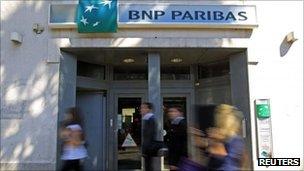Eurozone pays for trust deficit
- Published
- comments

BNP Paribas has announced plans to sell 70bn euros of assets to reduce its total exposures
Share prices of French banks bounced a bit yesterday, but they have fallen sharply since February - down 50% for BNP Paribas, 65% for Societe Generale.
There has been a similar trend for banks all over Europe, including in the UK.
But the rout in French bank shares has been particularly striking - because it was acute in recent days and on paper French banks don't look that weak.
In fact, what is most striking about this morning's modest downgrade of the debt of Soc Gen and Credit Agricole by Moody's, the ratings agency, is that the thrust of its analysis is relatively positive for the groups.
Strikingly, BNP Paribas avoided being downgraded.
In the case of Soc Gen, for example, its debt and deposits rating was reduced a fraction, largely because of Moody's decision to cease regarding it as significantly more likely to be bailed out by the French government in a crisis than BNP Paribas and Credit Agricole.
Or to put it another, Moody's now sees the implicit government guarantee for Soc Gen as big, rather than enormous.
Also, to the credit of French banks - and unlike British and Spanish banks, for example - they don't have huge loans to overpriced homes or to speculative commercial property. Nor do they share British and German banks' exposure to fragile Irish banks and the now deflated Irish property bubble.
But French banks are the largest bank lenders to southern European economies, Greece, Portugal, Spain and Italy, that are burdened by debts that may not be sustainable.
Even so, the banks claim, that if - as many now expect - there is a serious default by Greece and some kind of debt write-off by Italy, they would survive, because they have enough capital to absorb the losses (or so they claim).
French flair
This is a claim supported by Moody's - although Credit Agricole's relatively large exposure to Greece was a contributor to its debt downgrade.
Which points to the second source of weakness.
Fairly or not, these banks have been viewed as indulging in more creative accounting than other banks.
The chairman of a huge international bank (which isn't French) said to me yesterday that "nobody really believes their numbers". He added: "the perception is that the French banks report what the Banque de France, the French central bank, tells them to report."
The BBC's Robert Peston, Business for New Europe's Roland Rudd and former Chancellor Lord Lawson on another crucial test for the euro
Which is probably unfair. But in finance, perception is nine tenths of reality.
That takes us to the last point of weakness. French banks are relatively dependent on short term loans from wholesale markets, especially dollars borrowed from US and international investors.
Moody's, for example, says of Soc Gen that a quarter of its balance sheet is financed by the sale of debt securities and borrowing from banks - which is a high proportion.
Also 64% of Soc Gen's wholesale borrowing comes up for repayment in three months or less, which makes it vulnerable to a funding crisis in stressed market conditions.
In the current climate of hysteria about prospects for the eurozone in general, US lenders are not desperately keen to lend to French banks - especially when Christine Lagarde, the managing director of the International Monetary Fund, now says that eurozone banks in general need to raise significant amounts of new capital, just weeks after she was saying the opposite, in her previous role as finance minister of France.
Lacking confidence
So what is the biggest problem for the eurozone right now?
Well it's that politicians, regulators and bankers say everything is okay, and no one really believes them. Trust has evaporated.
French banks have been a victim of that collapse in trust.

Christine Lagarde is the first woman to lead the IMF
That is no reason for any of us in the UK to feel smug.
If, for example, Greece not only defaulted but also quit the eurozone, that could have hideous implications for the UK.
In those dramatic circumstance, investors, banks and assorted providers of finance would fear that other weaker economies could also leave the eurozone.
Their hard-currency euro loans to eurozone banks, businesses, households and governments would suddenly be perceived as devaluing, soft-currency loans.
That could trigger the mother of all funding crises for eurozone countries and banks.
Given the dependence of British companies on customers in the eurozone, given the massive financial exposure of Royal Bank of Scotland and Lloyds to Ireland, given the interconnection of our banks with eurozone banks, the UK would not be an immune bystander.
If the eurozone goes down in a chaotic disorderly way, the consequences for the UK would probably be worse than the recession precipitated by the 2007-8 credit crunch and banking crisis.
But that logic, of course, leads to an emotive debate in this country (you can get a flavour of this from this morning's Today programme interviews of Lord Lawson and Roland Rudd, external).
For eurozone fatalists, the UK should help the eurozone's leaders see the error of their ways and encourage them to disband the currency union in an orderly way.
Euro bond future
And for eurozone believers - and George Osborne appears to be one of these at the moment - it means that the UK should help the members of the eurozone along the road to political union, so that the strong balance sheet of the German economy is available to support the weaker economies.
There has been small incremental progress towards the creation of a single balance sheet for the eurozone, with the announcement by the President of the European Commission, Jose Manuel Barroso, that he will soon outline options for the sale of so-called euro bonds - or borrowing not by individual eurozone countries but by the eurozone as a homogeneous entity.
Mr Barroso, in making the announcement to the European Parliament, said: "We must be honest: this will not bring an immediate solution for all the problems we face and it will come as an element of a comprehensive approach to further economic and political integration."
Although he is downplaying expectations that these euro bonds would be the cure for the eurozone's malaise, he is taking quite a risk.
If euro bonds are proposed formally and then rejected by Germany, which looks quite likely, perceptions will only be heightened that eurozone governments lack the will and means to stem this crisis.